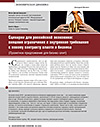Scenarios for the Russian Economy: External Constraints and Internal Requirements for a New Contract Between Business and Government (Project Proposal for the Business Elite)
By the beginning of autumn 2018, the Russian government and business have fixed the status quo — any change in the model (including the contract between the government and big business, concluded 15-20 years ago as a result of “equidistant oligarchs”) is out of question. In business logic, the authority (arbitrator) does not have the right to require too much (compliance with the code of a builder, if not of communism, then of socially acceptable capitalism) or to play along with its own adherents (give contracts to state companies, redistribute assets, etc.). Although in fact this happens “sometimes and somewhere in our country” (in state-owned companies and the public sector), but is considered an exception to the rule of “sterile capitalism”: business on its own (“pay taxes and sleep well”). Analyzing historical options of combining contracts with the people and the elite: in Catherine’s and Peter’s periods, the authors present possible options for the modern combination of contracts between the government and business, as well as with the population: the current neoliberal course, the course towards a social market economy and a forced tough (mobilization) course.
References:
- Klyayn N. Doktrina shoka: rastsvet kapitalizma katastrof [The Shock Doctrine: Heyday of Catastrophe Capitalism]. Moscow, Dobraya kniga, 2009.



